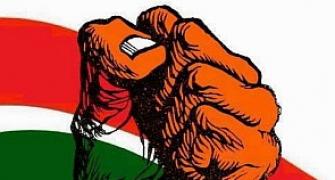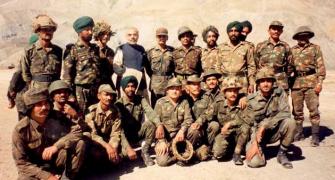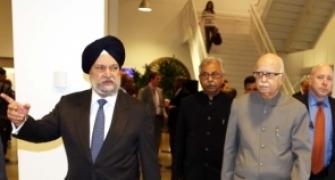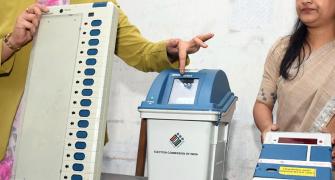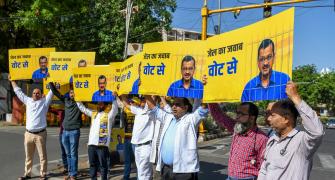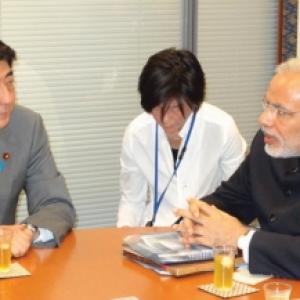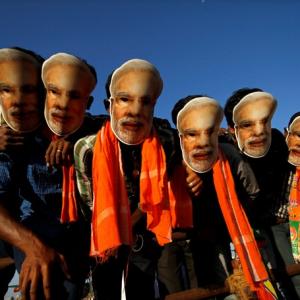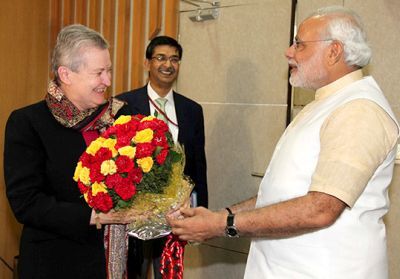 'Foreign policy-making cannot be shifted out of Delhi and the regional satraps, who do not have a national perspective, should not be allowed to dominate foreign policy. But regional inputs should be integral to foreign policy-making at every step of the way,' says Ambassador T P Sreenivasan.
'Foreign policy-making cannot be shifted out of Delhi and the regional satraps, who do not have a national perspective, should not be allowed to dominate foreign policy. But regional inputs should be integral to foreign policy-making at every step of the way,' says Ambassador T P Sreenivasan.
A tough line towards Pakistan, greater attention to building of Brand India, and a bigger role for the states in foreign policy-making are the proposed modifications of foreign policy put forward so far by Narendra Modi. His promise to allow states a bigger say in strategising and building foreign policy is unexceptionable.
The states which have special links with certain countries, either because of a common border or cultural and commercial affinities, should be consulted in framing policies towards those countries, he said. As examples, he gave the links of Gujarat with Africa, West Asia, China and Japan, Odisha with Indonesia, Goa with Portugal, Pondicherry with France, Tamil Nadu with Sri Lanka, Singapore and Malaysia and Bihar with Buddhist countries.
One could add Kerala and the Gulf countries, West Bengal and Bangladesh, Bihar and Nepal and Mauritius. Most states have links with the United States because of the large number of immigrants from these states. As stakeholders in India's relations with the countries concerned, it is only legitimate that these states be consulted and kept informed of developments.
Modi did not question the Constitutional position on foreign policy, which is crystal clear. It is within the exclusive jurisdiction of the Centre and there is no mechanism to consult the states. Some people believe that the Indian State is only quasi-federal because of the lack of autonomy given to the states in certain vital matters.
In his letters to the chief ministers, Jawaharlal Nehru often took regional leaders into confidence on some aspects of foreign policy, more to educate them than to consult them.
Foreign policy advocacy by certain states was not uncommon even then. But with the advent of coalitions, in which the regional parties had the power to make and unmake governments, state leaders began to play a decisive role in foreign policy.
With globalisation and economic reforms, ethnic, immigration and economic issues and even simple prejudices of regional leaders began to play a role.
The most recent dramatic instances were of Mamata Banerjee holding up the Teesta water-sharing agreement with Bangladesh, and J Jayalalithaa and M Karunanidhi pushing India to vote in favour of a US-sponsored human rights resolution on Sri Lanka. The Tamil Nadu legislature even passed a resolution asking the Government of India to move the United Nations Security Council to ask for a referendum in Sri Lanka on establishing a Tamil Eelam there.
It was not long ago that the Kerala legislature passed a resolution against the India-US nuclear deal. Less dramatically, Maharashtra and Tamil Nadu slowed down the Jaitapur and Kudankulam nuclear projects, Odisha forced a revision of a South Korean project and Kerala made it hard for the Centre to deal with the Italian marines, who killed two fishermen off the state's coast.
There have been other state interactions with neighbouring countries. Pakistan announced its readiness to buy power from Gujarat, the Bihar chief minister has been hosting dinners for Nepal politicians and the chief minister of Punjab has received a gift of a buffalo from the chief minister of Pakistani Punjab.
Taking these into account, the noted columnist, Nitin Pai, has suggested the setting up of a Subcontinental Relations Council, headed by the prime minister and comprising the external affairs minister and the chief ministers of all states that have external borders.
The way to deal with the situation is for the Centre to subsume the interests of the states. Coalition politics cannot be permitted to sway foreign policy beyond a point. Trade agreements are particularly important, when products, which are special to different states, are covered in such agreements. The virtual veto given to the states on the issue of FDI in retail is a case in point.
Jammu and Kashmir is, of course, a special case when it comes to foreign policy. The state leaders have always been consulted on our policy towards Pakistan. Moreover, the state has used our differences with Pakistan to push for its own autonomy in various ways. The special privileges that Kashmir enjoys are a consequence of our foreign policy preoccupations.
The role that the Hurriyat plays in relations with Pakistan is significant. The Hurriyat leaders meeting Pakistani leaders in India has almost become routine. In the name of Pakistani sensitivities, the state adopts positions, which the other states will not be permitted to do.
Of late, chief ministers and others have begun to visit foreign countries to canvass investments, to seek changes in immigration policies and to smoothen trade regulations. Increasingly, foreign dignitaries too have begun to visit the states to win potentially powerful regional leaders. Hillary Clinton chose to visit Mamata Banerjee in Kolkata and Jayalalithaa in Chennai. She made a policy statement on the US rebalancing in the Pacific not from Delhi, but from Chennai.
A day may come when foreign dignitaries will do their business in the states and go to Delhi only to pay homage to the Father of the Nation and to receive the ceremonial welcome at Rashtrapati Bhavan!
The foreign consulates have stepped up their activities in several states. Requests for appointment of honorary consuls have multiplied. The states have also begun to push for internationalisation of education to gain benefits abroad.
Turning to Kerala, there has been sustained interest in foreign affairs in the state, but it was confined to sending some Menons, Nairs and Panikkars to South Block and trusting them to take care of Kerala's interests. Today, Kerala pressurises the Centre to send Malayali envoys to the Gulf, in the expectation that they would look after the Kerala labour in those countries better.
At the time of the nuclear deal, the leftist government in Kerala campaigned strongly against it. The same government raised an alarm when a trade agreement between India and ASEAN came up. It agitated that the loss of revenue to the state should be avoided even if there were more than corresponding benefits for the Centre.
Kerala insisted that the bilateral relations between India and Italy should not be dragged into the legal case against the Italian marines. Even the United Front Government, dominated by the Congress party, felt deceived when its jurisdiction in the case was questioned. Kerala was confident that a settlement could be reached with the Italians with the help of the church, if the Centre had not intervened.
The Centre should be more sensitive to the needs and concerns of the states. Some methods of institutionalised consultations between the ministry of external affairs and the states have been mooted in the past. Apart from the MEA branch secretariat in Kolkata, which was set up under special circumstances, a proposal to station senior MEA officials in major state capitals was mooted by the then foreign secretary Shyam Saran and it was partly implemented.
Other suggestions such as annual consultations with the states on foreign policy, inclusion of the relevant chief ministers in the prime minister's delegations to certain countries etc have been suggested.
Serving officers of the ministry of external affairs should brief think-tanks and other groups who are interested in foreign policy through outreach programmes and provision of support to them for sustaining themselves. More courses should be started in international relations in the universities to enthuse youngsters. State media take an interest in foreign affairs only when something of their immediate interest happens and they tend to be negative about them. The successes in foreign policy elsewhere go unnoticed in the process.
Intensive and continuous interaction between the Centre and the states is important to allay the fears of the states regarding foreign policy being made in Delhi.
Foreign policy-making cannot be shifted out of Delhi and the regional satraps, who do not have a national perspective, should not be allowed to dominate foreign policy. But regional inputs should be integral to foreign policy-making at every step of the way.
If regional leaders, think-tanks and media are fully briefed, they will become partners in foreign policy making and implementation rather than hurdles.
Image: Narendra Modi greets US Ambassador Nancy J Powell in Gandhinagar. Photograph Courtesy: www.narendramodi.in
Ambassador T P Sreenivasan (Indian Foreign Service, 1967) is former ambassador of India and governor for India of the IAEA; executive vice-chairman, Kerala State Higher Education Council; director general, Kerala International Centre. His earlier columns can be read here.

